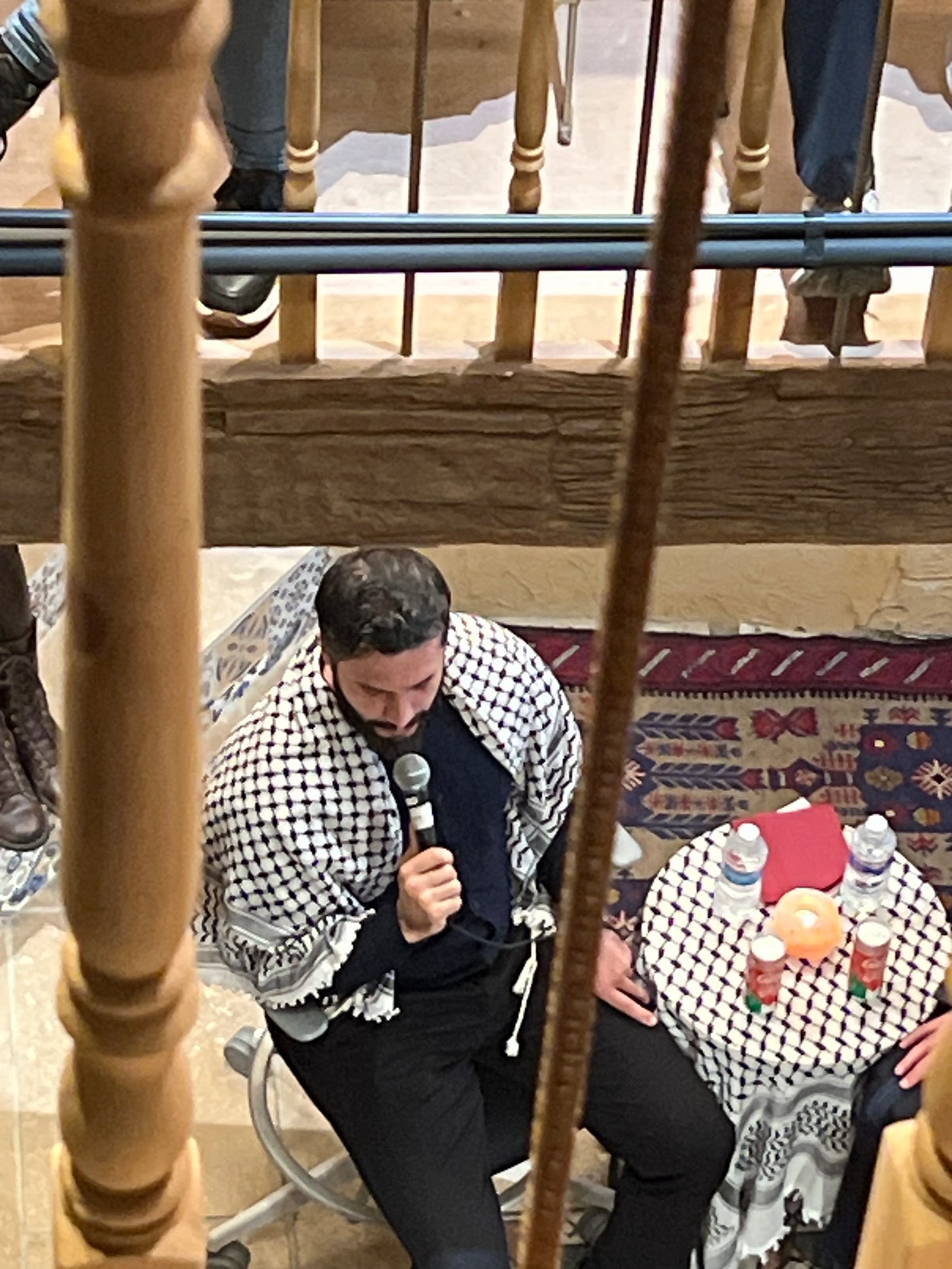A Doctor who lived amongst the Blessed People of Gaza
Dr Muhammad Tahir is a UK trained orthopaedic surgeon with a specialty in peripheral nerve injuries. This week I heard him share some extraordinary, shocking experiences of his recent time in Gaza.
Earlier this week I went to hear Dr Muhammad Tahir speak about his experiences working in Gaza over the past few months.
It was a valuable evening. His first-hand testimony of the horrors he had seen were more powerful than any number of images that continue to bombard our social media feeds. His accounts of the inspiring people he met were moving. His insights into how this all affected him spiritually and in his understanding of humanity were educational. And his understanding for the need for Muslim unity were insightful.
He was moved by what he saw in terms of the slaughter in Gaza, so volunteered to go help with the humanitarian organisation FajrScientific.
From the moment he arrived he was put to work alongside the other health-workers in conditions he could not have imagined - days per week, with only time to eat, pray and sleep.
There were days when they’d be exhausted yet more cases would come in, so they’d be forced to carry on.
There were days when surgical teams would be operating on several patients in one room due to lack of space.
Shrapnel from F16s or tanks or bombs from quadcopters would cause tissue death - and gunpowder residue and/or dirt enter wounds - so causing infection, wound breakdown, bleeding, and often amputation.
Often, the teams would work to save people lives and limbs, but the lack of capacity ( even basic things like cannulas and antibiotics) placed additional limitations.
The death count to date was 61 000 - but the Lancet estimates of 150 000 - 200 000 were realistic because people with other basic medical conditions- heart attacks, strokes, cancers, infections etc - were unable to have their conditions treated when the system was overwhelmed by immediate need for dealing with war injuries.
When they did have successes, by the permission of Allah, there were mixed feelings. Medical teams saved an 8-month old, but the realisation that baby’s entire family had been wiped out left them feeling saddened.
He said that Gaza now had the greatest number of child amputees in the world - approximately 4500- and the need to save lives by having to amputate limbs that could not be saved was something that clearly shook him.
He described how courageous the local health workers were. Medical students were functioning at registrar-levels in order to help as many people as they could.
He recounted the shocks he felt witnessing the scale of destruction. First in Khan Younis. Then in Rafah. Then later in Beit Hanoun. All laid to waste. His description of the crimes committed at Al Shifaa hospital were nightmarish.
Yet despite the criminal destruction, the Gazan medical teams continued to work, outdoors if necessary.
The people of Gaza had conviction in their Islamic faith and in the Akhira so strong that they were willing to sacrifice and share, and to help others despite their own hardships.
His colleagues would not complain or talk negatively but did ask him “Why have the people of the world abandoned us? Why do they let our children die like this. Or to beg in the streets for help? We are dignified people who do not feel right doing this.”
He said that had no answer to this most obvious of questions.
He walked with their on their great march of return from the south to the north. There he saw one friend who had never shown negative emotion shed a silent tear when he saw his home in ruins.
In the question and answer section he was asked: How can we build Arab unity to help the people of Palestine?
Dr Tahir said we had to go beyond Arab unity buy look to Muslim unity. He said we seem to be struggling with artificial lines divinding us. Why did people to for US to save us? They will never save us. Israel, he said, is their outpost. The time had come for us to overcome these artificial colonial borders, end sectarianism and petty squabbling. He said we needed to call out those who pretended to advocate for human rights.
There is no doubt this Ummah has the material capability and resources to rescue Gaza and all of Palestine. But without a unified and sincere leadership, this will not happen.
His goal, he said, was to see a free Palestine. The people of Gaza had said he was one of them, and truthfully he looked heart broken that he was not there with them. How trivial the matters of daily life here must feel when he has seen what he has seen.
How, I have wondered many times over the past 16 months, can any of us complain about anything when we see what the people of Gaza, and Palestine generally, have endured.
They are a people you cannot conquer, he said - and you won’t conquer.
Recently I heard an older Palestinian man on social media responding to Donald Trump’s proposal to get the people to leave and America to directly take over.
“Never!” he said. “We are the Murabitun (i.e. the front-line of defence) in the land of Palestine”.
That is how they see themselves. Doing a duty on behalf of the Ummah. Sacrificing on our behalf to protect the blessed land.
They are the blessed ones that Dr Tahir has lived amongst, and tried to help, for so many months.
Abdul Wahid has been active in Muslim affairs in the UK for over 25 years. He has been published on the websites of Foreign Policy, Open Democracy, the Times Higher Educational Supplement, and Prospect Magazine. You can follow him on X/Twitter @AbdulWahid_X and elsewhere: https://linktr.ee/abdulwahid101010




